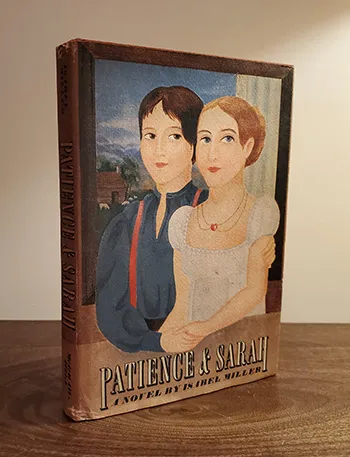
PATIENCE AND SARAH
ISABEL MILLER
© 1969 Isabel Miller
$19.95
225 pages
Content warning: Physical abuse, domestic violence, attempted sexual assault, racism, incest, animal abuse
Patience and Sarah is a 1969 historical novel created by Isabel Miller (real name Alma Routsong) after she'd consulted a Ouija board for a year, with her girlfriend acting as a medium. You can stop now, because that's the most interesting part of this entire milquetoast novel.
It's slow. There's casual racism, jarring perspective shifts, and unlikeable characters. There's an excessive amount of incest: the main character's biological sister offers to sleep with her to prevent her from leaving, while the other main character's sister-in-law says sex with a woman is only appropriate if it's "in the family." In short, I recommend this book with a side of eye bleach.
This also arguably started off the historical Lesbian craze. So if you loved Portrait of Woman on Fire or hated Ammonite, you have Routsong to thank. And like many frustrating Queer historical stories, it focuses so much on what's keeping the couple apart that there's little left over for what brought them together, other than the fact that they're Queer.
To summarize, Patience lives with her brother, Edward, and his wife, Martha. Their parents are dead and have split their meager possessions 50/50, much to the disappointment of Edward. True to Queer stereotype, Patience starts the story by contemplating suicide, thinking that it would make Edward and Martha's lives easier. Martha and Patience had a bit of a thing, and Patience now feels bitter that Martha chose her brother, but is later cheered to hear that Edward and Martha have terrible sex, in addition to Martha's difficult pregnancies. A few acres away, we have tall woodchopper Sarah, raised by her father to be a boy, since he had no son.
Patience meets Sarah; two days later, they kiss and decide to move in together. Despite its other glaring flaws, there's thankfully little of the slow Lesbian yearn here. These Lesbians were U-Hauling long before U-Hauls were invented. Stagecoach Lesbians.
Then Sarah's father finds out. Patience, to protect herself, tells him and Edward that they never had a relationship. Sarah, rejected and crushed, runs away to dress as a boy on the road. She runs into Parson, a traveling preacher, and they travel together until he, thinking that she's a young boy, hits on her, only to realize she's a woman and lose interest. Sarah comes back and meets up with Patience again. They "embrace with their corsets open" and are kicked out, but together this time.
With the money Edward gives her for her property, Sarah takes Patience to Green County, and they get a nice little farm with a dog. And so Lesbian cottagecore dreams the world over were launched.
It's interesting to wonder how Sarah's character might have changed if offered the more diverse gender options of our times. She goes between dressing as a woman and passing as a man with little thought about it other than the usefulness of it. When she and Patience live together on their farm, she once again offers to act as a man. It's unclear how much of this gender play is motivated by an intrinsic longing versus pragmatism, or disguised as pragmatism.
The relationship between Patience and the younger Sarah is frustrating. The former manipulates the latter, both in terms of controlling her gender expression and setting the circumstances for them being forced out of their hometown. Other than both being interested in boob play, they have little in common and little to root for.
Sarah is a character in need of an adventure arc. As written, she didn't seem meant to be the side piece of a rural painter. In the first arc, Sarah's father forbids her from seeing Patience and beats her whenever she tries to, which she does every day. Patience never once checks on Sarah. When Sarah's father brings her to Patience to "end the foolishness," Patience says to Sarah (still blue from her daily beatings) that their relationship was a joke.
When Sarah – after attempting to have her own life – returns to her hometown, it's not a triumph; it's a failure. She can't make it on her own, either as a boy or a woman. So she goes back to the family she swore to never return to and the woman who could not bother to walk the few acres to her home.
I wish this would have instead been Sarah's story of how she once fell in love with a woman in her hometown, ran away when it ended, lived her adventures as a man, explored some gender feelings, and finally met a lovely woman somewhere far from the depressing New England town she was born in. Which is progress, maybe – that we've gotten to a point where this, the wildest Lesbian fantasy of the 1960s, is my nightmare.

